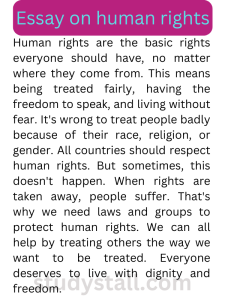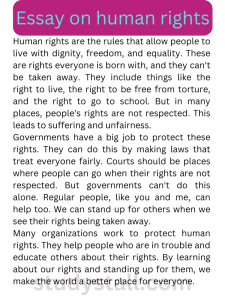Human rights are fundamental rights and freedoms that every individual is entitled to. They are inherent to all human beings, regardless of their nationality, race, gender, religion, or any other status. These rights are protected by international law to ensure that every person is treated with dignity, equality, and justice. In this essay, we will explore the importance of human rights, their historical development, and the challenges faced in securing and promoting them globally.
Essay on Human Rights (100 Words)
Human rights are the basic rights everyone should have, no matter where they come from. This means being treated fairly, having the freedom to speak, and living without fear. It’s wrong to treat people badly because of their race, religion, or gender. All countries should respect human rights. But sometimes, this doesn’t happen. When rights are taken away, people suffer. That’s why we need laws and groups to protect human rights. We can all help by treating others the way we want to be treated. Everyone deserves to live with dignity and freedom.
Essay on Human Rights (200 Words)
Human rights are the rules that allow people to live with dignity, freedom, and equality. These are rights everyone is born with, and they can’t be taken away. They include things like the right to live, the right to be free from torture, and the right to go to school. But in many places, people’s rights are not respected. This leads to suffering and unfairness.
Governments have a big job to protect these rights. They can do this by making laws that treat everyone fairly. Courts should be places where people can go when their rights are not respected. But governments can’t do this alone. Regular people, like you and me, can help too. We can stand up for others when we see their rights being taken away.
Many organizations work to protect human rights. They help people who are in trouble and educate others about their rights. By learning about our rights and standing up for them, we make the world a better place for everyone.
Essay on Human Rights (300 Words)
Human rights are important for all people. They are the basic rules that let us live with respect, freedom, and peace. These rights include things like freedom of speech, the right to a fair trial, and the right to privacy. But many times, people are denied these basic rights. This happens in different countries and communities, and it is a big problem.
Governments are supposed to protect human rights. They should make sure that everyone is treated fairly, no matter who they are. They can do this by making good laws and punishing those who break them. They also need to give people the chance to say how they feel and what they think. This is called democracy, and it is a key part of human rights.
But just having laws is not enough. People need to know about their rights to protect them. Schools should teach kids about human rights from a young age. Parents should talk to their kids about treating everyone fairly. And when someone’s rights are taken away, it is the job of everyone to speak out.
There are many ways to help. You can join groups that stand up for human rights, or talk about it with your friends and family. The internet makes it easy to learn and share information about this issue. Even little acts can make a big difference.
In the end, human rights are important for a fair and peaceful world. By respecting each other’s rights, we make a better life for everyone. We should all work together to protect human rights and create a world where everyone can live in peace.
Essay on Human Rights 500 words
Importance of Human Rights
Human rights play a vital role in the well-being and development of individuals and societies. They serve as a safeguard against discrimination, oppression, and abuse, ensuring that everyone has the opportunity to lead a life of freedom, dignity, and fairness. By protecting human rights, we create a foundation for peace, social justice, and sustainable development.
Protection of Individual Freedoms
Human rights encompass a wide range of freedoms and liberties. They include the right to life, liberty, and security of person, freedom of thought, expression, belief, and religion, as well as the right to education, work, and adequate living conditions. These rights empower individuals to express themselves, pursue their aspirations, and live a fulfilling life without fear of persecution or repression.
Equality and Non-Discrimination
Human rights promote equality by prohibiting unfair treatment and discrimination on various grounds such as race, gender, age, disability, or social status. They ensure that all individuals have equal opportunities and access to resources, services, and opportunities, irrespective of their background. By eliminating discrimination, human rights contribute to a more inclusive and just society.
Social Justice and Accountability
Human rights serve as a tool for social justice. They hold governments, institutions, and individuals accountable for their actions and provide mechanisms for seeking redress in cases of violations. The rule of law, fair trials, and access to justice are essential components of human rights, ensuring that those responsible for human rights abuses are held accountable, and victims receive justice.
Peace and Security
Respecting and protecting human rights are crucial for maintaining peace and security. Societies that uphold human rights are more likely to experience stability and harmony, as individuals feel secure and confident in their rights and freedoms. Conversely, societies with rampant human rights violations often suffer from conflicts, tension, and violence.
Historical Development of Human Rights
The concept of human rights has evolved over centuries, influenced by various historical events, philosophical ideas, and social movements. Below, we briefly explore some key milestones in the development of human rights.
Ancient Roots
The roots of human rights can be traced back to ancient civilizations, where certain principles of fairness and justice existed. For instance, the Code of Hammurabi in ancient Mesopotamia established laws to protect vulnerable groups and ensure justice. Similarly, ancient Greek and Roman societies recognized the importance of individual freedoms and legal rights.
Enlightenment and Enlightenment Thinkers
The Enlightenment period of the 17th and 18th centuries played a significant role in shaping the modern concept of human rights. Thinkers like John Locke, Thomas Paine, and Jean-Jacques Rousseau advocated for individual liberties, natural rights, and social contracts between citizens and governments. Their ideas laid the foundation for the later articulation of human rights.
Universal Declaration of Human Rights (UDHR)
The Universal Declaration of Human Rights, adopted by the United Nations General Assembly in 1948, is a landmark document that sets out the fundamental human rights to be universally protected. It encompasses civil, political, economic, social, and cultural rights, serving as a comprehensive framework for human rights standards worldwide.
Subsequent International Human Rights Instruments
Following the adoption of the UDHR, numerous international treaties and conventions have been established to further protect and promote human rights. These include the International Covenant on Civil and Political Rights (ICCPR), the International Covenant on Economic, Social and Cultural Rights (ICESCR), and the Convention on the Rights of the Child (CRC). These instruments have contributed to the development of a robust human rights framework at the international level.
Challenges in Securing and Promoting Human Rights
Despite significant progress in the recognition and protection of human rights, numerous challenges persist in securing and promoting them globally. Some of the key challenges include:
Violations and Lack of Accountability
Human rights abuses continue to occur worldwide, often due to political instability, armed conflicts, or repressive regimes. Violations such as torture, arbitrary detention, discrimination, and restrictions on freedom of expression pose persistent challenges. Additionally, the lack of accountability for perpetrators of human rights abuses undermines efforts to promote and protect these rights.
Discrimination and Inequality
Discrimination remains a significant obstacle in ensuring equal enjoyment of human rights. Marginalized groups, including women, ethnic and religious minorities, LGBTQ+ individuals, and persons with disabilities, often face systemic discrimination and barriers to their rights. Overcoming discriminatory practices and promoting equality require sustained efforts and inclusive policies.
Limited Awareness and Education
Many individuals, particularly in marginalized communities, may not be aware of their rights or how to assert them. Lack of education and awareness about human rights can hinder their effective enjoyment and protection. Promoting human rights education and awareness campaigns are essential to empower individuals and communities to advocate for their rights effectively.
Global Cooperation and Enforcement
Securing human rights on a global scale requires international cooperation and enforcement mechanisms. However, differing political interests, sovereignty concerns, and the absence of a centralized enforcement body make the enforcement of human rights challenging. Strengthening international cooperation and accountability mechanisms is necessary for ensuring the effective promotion and protection of human rights.
Conclusion
Human rights are a cornerstone of a just and equitable society. They provide individuals with the necessary freedom, dignity, and protection to lead fulfilling lives. While significant progress has been made in recognizing and protecting human rights, challenges remain. It is crucial for governments, civil society organizations, and individuals to work collectively to address these challenges and ensure the universal enjoyment of human rights. By doing so, we can create a world where every person’s rights are respected and upheld, regardless of their background or status.
FAQ
- What are human rights?
- Human rights are fundamental rights and freedoms that every individual is entitled to, regardless of their nationality, race, gender, religion, or any other status.
- Why are human rights important?
- Human rights are important because they safeguard individuals against discrimination, oppression, and abuse, ensuring that everyone has the opportunity to lead a life of freedom, dignity, and fairness. They also create a foundation for peace, social justice, and sustainable development.
- How do human rights promote equality?
- Human rights promote equality by prohibiting unfair treatment and discrimination based on race, gender, age, disability, or social status. They ensure that all individuals have equal opportunities and access to resources, services, and opportunities, regardless of their background.
- What role do human rights play in social justice and accountability?
- Human rights serve as a tool for social justice by holding governments, institutions, and individuals accountable for their actions. They provide mechanisms for seeking redress in cases of violations, ensuring that those responsible for human rights abuses are held accountable, and victims receive justice.
